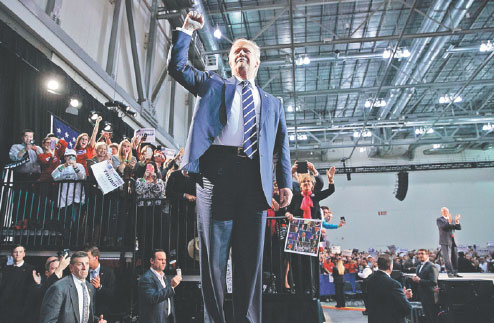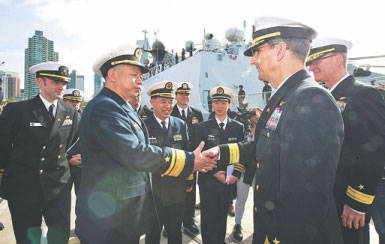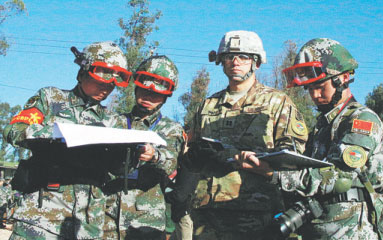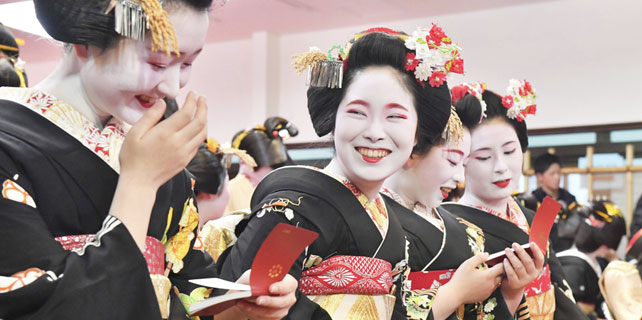Calm urged in face of new US administration
 |
|
Donald Trump pumps his fist as he arrives to speak at a campaign rally in Grand Rapids, Michigan, on Nov 8, when he was the Republican Party's presidential candidate. [EVAN VUCCI/AP] |
Donald Trump could prompt a sea change in the relationship between China and the United States. By Chen Weihua in New York, Li Xiaokun in Beijing and Fu Jing in Brussels.
In light of US President-Elect Donald Trump's hawkish remarks about China, allied to a number of unexpected moves in the wake of his election victory, experts in Sino-US studies around the world have expressed deep concerns about the key relationship.
Many of the experts have warned that the Sino-US relationship may revert to the deep, mutual distrust that characterized relations between the countries during the 1960s.
Ted Carpenter, senior fellow of defense and foreign policy at the Cato Institute in Washington, said he is "increasingly worried" about Trump's policies regarding China.
"At first, I thought that Trump was engaging in the 'China-bashing' that is fairly typical of US presidential campaigns. Yet once in office, new presidents have pursued policies very similar to those of their predecessors since the early 1970s," he said, adding that Trump's post-election actions suggest that something else may be going on.
"The telephone conversation with Tsai Ing-wen was startling enough, but the Trump transition team's insistence on referring to her as the 'President of Taiwan' indicated sympathy with hard-line Taiwanese separatists," he said, referring to a phone call between Trump and the Taiwan leader on Dec 2, which broke with decades of diplomatic precedent.
Later, Trump said he didn't feel "bound by the one-China policy" unless the US could gain benefits from China in trade and other areas.
 |
|
Rear Admiral Huang Xinjian (second from left), of the People's Liberation Army Navy, is welcomed at the US port of San Diego where three PLA Navy ships arrived on Dec 6. [YANG LEI/XINHUA] |
Emotional stake
"It was clear that he saw Taiwan, the South China Sea, trade issues, currency valuations and North Korea as roughly equal bargaining chips for bilateral negotiations," Carpenter said. "I believe that his attitude greatly underestimates China's emotional stake in those issues-especially the South China Sea and Taiwan.
"If Trump is serious about discarding the one-China policy, we are in for a very tense and dangerous period. Hasty action could trigger a ruinous economic crisis or much worse, a military conflagration."
Jon R. Taylor, professor and chair of the department of political science at the University of St. Thomas in Houston, Texas, said: "Trump is about to create a very difficult period in China-US relations, one that may rival that of the 1950s and 60s. I am deeply concerned that Trump is rapidly moving US foreign policy toward a deep Cold War mindset regarding China.
"My profound fear is that Trump has surrounded himself with anti-China hardliners who have little experience with or expertise on China, have rarely, if ever, visited the country, and have little understanding beyond textbooks and oped pieces of the nuances and subtleties of China's history, culture, and political system."
Yongwook Ryu, a visiting professor at the Graduate School of International Studies at Yonsei University in Seoul, believes that Trump's foreign policy will be more focused and selective, with the overarching purpose of maximizing US economic interests.
"If China and the US attempt to test each other's resolve, then we are highly likely to see tensions rise in the region-in the East China Sea and the South China Sea," he said.
As for the impact of a US power shift on China's relations with its neighbors, Ryu said US policy toward Asia will see more continuity, "although it will be less multilateralist because Trump is likely to strengthen its (the US') alliance with Japan, South Korea, and Australia".
Professor David Fouquet, vice-president of the executive board of the European Center for International Research and Strategy in Brussels, said some people in the US might accept a tougher policy on China.
"But would America's Asian allies, who have repeatedly asked to not have to make a choice in a US-China showdown and are dependent economically on China, and could suffer more-in addition to already having been abandoned by the American reversal on the Trans-Pacific Partnership trade agreement?" he said.
"There is a lengthy list of tradeoffs, compromises or concessions to make in such complex relationships, and I am not convinced that the new American leadership understands this."
 |
|
Soldiers participate in joint humanitarian relief drills held by Chinese and US armed forces in Kunming, the capital of Yunnan province, on Nov 18. [NATALIE THOMAS/REUTERS] |
Russian influence
Artyom Lukin, deputy director of research at the School of Regional and International Studies at the Far Eastern Federal University in Vladivostock, Russia, said the exchange of goodwill between Trump and Moscow signals subtle changes in Russia's ties with China.
According to public opinion surveys, Russia was the only country to prefer Trump over Hillary Clinton, the Democratic Party's presidential candidate. "Since 2012, ties between Moscow and Beijing have been expanding and deepening, especially in the political-military domain," Lukin said.
If Moscow normalizes relations with Washington, "the Sino-Russian partnership will continue, with the emphasis shifting to economics and trade", he added.
Shada Islam, director of Europe and geopolitics at Friends of Europe, a think tank in Brussels, advised Beijing to "stay cool and calm" about any changes made by Trump, "and firm on its core interests, but without falling into the trap of becoming belligerent".
"Trump's presidency will be a chance for China to show its own maturity and its role as a responsible global actor," she said.
Testing the water?
Cui Hongjian, director of the department of European studies at the China Institute of International Studies in Beijing, was relatively optimistic about the incoming US administration.
"Even though Trump is not a professional politician, even though he has some ideas which are different from mainstream elites in the past, as long as he is smart, he will understand that disordered China policies will not only affect China, but also himself," he said.
Cui suggested that Trump "might be just testing the water and changing the sequence in which he plays his cards".
Instead of guessing which cards the US will play, China should think deeply about the cards it has and sometimes take the initiative, he said.
"Some people say Trump follows the thinking of businessmen about trade benefits. If so, we need to think about two questions: first, whether China accepts the model; and second, what our model will be if we do not accept his (model) and what we can trade with if we do accept," he added.
Li Guofu, head of the Middle East department at CIIS, said certain basic facts will still apply, no matter who occupies the White House.
"To develop its economy, the US has to cooperate with China. If Trump is rational, given his business background there will be more, not fewer, fields of potential cooperation between the two powers," he said.
Ren Qi and Chu Yi in Beijing contributed to this story.
















